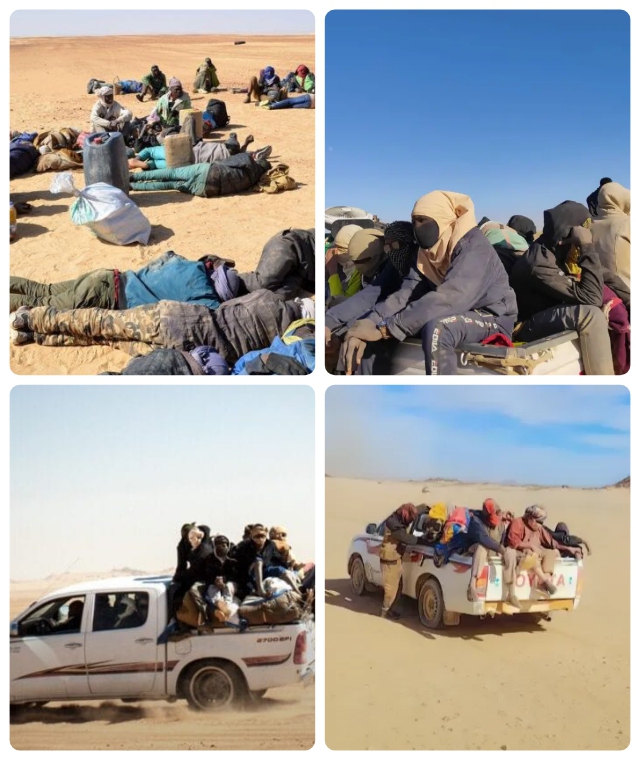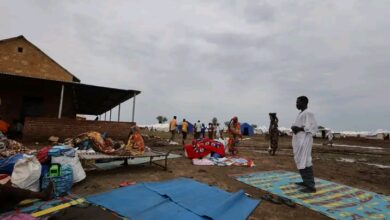Sudanese Migrants: From the Ravages of War to the Traps of Smuggling via Egypt and Libya
Mashaweer - Agencies

Bahr al-Din Yaqub fled Sudan seeking refuge in Egypt after a missile destroyed his home in Khartoum and killed four of his friends. However, economic hardships and tightening restrictions on refugees in Egypt pushed him to continue his journey—first through dangerous smuggling routes across the desert toward northeastern Libya, then on another perilous trip across the sea to the Greek island of Crete.
Migrants, smugglers, aid workers, and activists say Yaqub, 25, is among a small but growing number of Sudanese refugees who are leaving Egypt and exploring opportunities in Libya, rather than returning to their homeland, where civil war has raged since April 2023.
Escaping Egypt
While tens of thousands of Sudanese have been documented crossing into Libya via the shared border, the issue of Sudanese fleeing north from Egypt—with no choice but to take the northern route—has not previously been reported.
For this story, Reuters interviewed 32 Sudanese refugees. While a few remained in Egypt, most recounted how they left due to difficult conditions and headed to Libya, Greece, and France.
As more Sudanese head to Libya, where the situation can be fraught with danger for refugees, increasing numbers are boarding boats to Europe.
Preliminary figures from the UN High Commissioner for Refugees (UNHCR) show a 134% surge in Sudanese arrivals in Europe during the first five months of this year compared to the same period last year—even though total numbers crossing from North Africa have decreased.
Crossing the Sea from Libya
Speaking about crossing the sea from Libya, Yaqub said:
“We knew from the start that the journey was dangerous. If we stayed in Sudan, we would die—and in Egypt and Libya too. So our only option was to risk death or leave.”
He recounted being detained and abused by Libyan authorities and militias.
Europe has supported the Libyan coast guard, which returns intercepted migrants to detention centers, and has funded border control programs in Libya. A 2023 UN fact-finding mission concluded that crimes against humanity had been committed against migrants in some of these centers.
Major General Ibrahim Al-Arbad, head of the anti-illegal migration department in the al-Butnan region of eastern Libya, stated that between 20,000 and 25,000 Sudanese crossed into Libya from Egypt since the start of the war in Sudan. He noted that many held refugee status in Egypt but struggled to settle due to economic issues.
He added that between 200 and 250 Sudanese were crossing weekly as of May and expected that number to rise during the summer months.
Seeking Safety Outside Egypt
The UNHCR estimates that more than 4 million Sudanese have fled to neighboring countries since fighting began between the Sudanese army and the Rapid Support Forces.
The majority—by a wide margin—have fled north to Egypt, which now hosts an estimated 1.5 million Sudanese refugees.
Although Egypt initially allowed entry without visas for most people (except working-age men), it later tightened entry requirements as the number of arrivals surged. Migrants, lawyers specializing in immigration, and aid workers say this prompted more Sudanese to resort to smuggling routes to enter the country.
They also said that obtaining residency in Egypt—essential for accessing healthcare and education—became more difficult due to long delays and financial obstacles.
Egypt’s Foreign Ministry and General Authority for Information did not respond to requests for comment.
Minister of Parliamentary and Legal Affairs Mahmoud Fawzy denied that any restrictions were imposed on issuing residency to Sudanese migrants.
However, many cannot afford the process, which requires a deposit of around $1,000 under a decree issued in August 2023. This has forced many to live on society’s margins, with some instead pursuing lengthy UN refugee status procedures.
Three immigration lawyers in Egypt who handled hundreds of similar cases said a government crackdown last year placed those who failed to pay at risk of arrest or deportation, regardless of their refugee status.
Human rights groups and immigration lawyers say deportations from Egypt increased following the implementation of a new asylum law at the end of last year, which transferred authority for refugee registration from the UN to the government.
Mohamed Lotfy, director of the Egyptian Commission for Rights and Freedoms (a local NGO), said:
“The sense of insecurity caused by this new system, along with their inability to return to Sudan, is pushing refugees to seek safety outside Egypt, even at the risk of further migration.”
Fawzy denied any discrimination against Sudanese migrants, saying they receive all their rights, and that deportations only target those who violate the law or choose to return voluntarily.
No Way to Stay
After fleeing Khartoum a few weeks into the war, Yaqub moved three times within Sudan searching for safety. When he found none, he paid smugglers to take him to Egypt. He believed the three-day desert journey would bring him to safety and stability, but life in Egypt proved difficult.
After arriving in Cairo in January 2024, he slept on the streets for several days in the cold while waiting to register with the UNHCR. He eventually accepted that the process would take a long time.
He moved into a small apartment with eight other Sudanese and tried to earn money through sporadic day labor. Without proper documentation, he faced the risk of arrest as authorities began targeting undocumented migrants for deportation.
Speaking from a migrant camp outside Athens, Yaqub told Reuters:
“The conditions there weren’t suitable for a refugee. I didn’t have the necessary documents and was constantly running from the authorities. There was no way to stay.”
He added: “I was afraid of being arrested and deported to Sudan. So I went to Libya, but the situation there was much worse.”
Critics of the new asylum law argue that its criteria for refugee status are vague, threatening the legal protection of recognized refugees, including those holding UNHCR papers.
Lotfy, whose organization provides legal aid to migrants, said the new law appears to have encouraged security forces, with a rise in police reports and legal cases targeting Sudanese and other sub-Saharan Africans.
He added that his organization had documented dozens of cases in which police confiscated UNHCR documents before deporting refugees.
Minister Fawzy denied that any registered UNHCR refugee or asylum seeker had been deported.
While deportation figures are not published, two Egyptian security sources told Reuters, on condition of anonymity, that Egyptian authorities deported nearly 21,000 Sudanese by the end of March 2025 for lacking legal status or violating Egyptian laws.
Amnesty International also documented the detention of migrants in Egypt in harsh and inhumane conditions ahead of deportations that it described as violations of international law.
Exploiting the Migration Card
Egyptian officials say the government has been generous in hosting such a large number of Sudanese despite economic pressures, including soaring inflation and a dollar shortage.
Minister Fawzy insisted that all migrants benefit from national aid programs.
However, Sudanese migrants in Egypt interviewed by Reuters denied this claim, as did an internal European Union Commission report from 2024 seen by the agency.
The report stated that around 1.5 million out of the 9 million migrants Egypt claims to host are living in hardship. The UNHCR said it had registered nearly one million refugees and asylum seekers in Egypt as of May 2025.
The report added: “Migrants and refugees are not eligible for local support or social protection programs, and many suffer from food insecurity,” prompting many to leave.
Five Western diplomats and EU officials said Cairo has tried to pressure Brussels into increasing financial assistance in exchange for curbing migration to Europe.
Tineke Strik, a European Parliament member and EU rapporteur on Egypt, said that during a December 2024 visit, she met Minister Fawzy, who told her: “Imagine if our border guards took a four-week vacation—what do you think would happen?”
Strik commented: “They are using the migration card to secure EU funding.”
Fawzy declined to comment.
In March, the EU announced a €7.4 billion aid package for Egypt as part of efforts to stem migration flows.
Anti-migrant rhetoric has intensified across the EU since more than a million migrants—mostly from Syria—crossed the Mediterranean in 2015.
Right-wing and nationalist parties have capitalized on this sentiment, pushing governments to adopt stricter migration policies focused on deportation and relocating migrants to third countries with no ties to them—moves that have drawn criticism from human rights groups.
Two months after arriving in Libya, Yaqub boarded a rubber dinghy to Crete with about 50 others, mostly Sudanese.
According to the European border agency Frontex, the Eastern Mediterranean route he took was the second most active for reaching the EU from January to April, with 12,228 crossings. The Central Mediterranean route to Italy and Malta was the busiest.
Though traffic on the Eastern route dropped year-on-year, Sudanese were among the top three nationalities between January and May, totaling approximately 1,469—up from 361 in the same period last year and 237 the year before.
Yaqub expressed relief at finally reaching safety in Greece and starting to think about the future.
He said, “If Greece offers me safety and stability, I’ll stay.”




